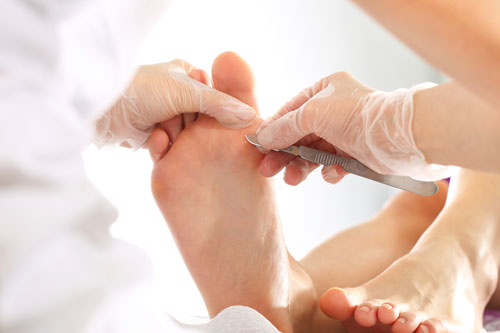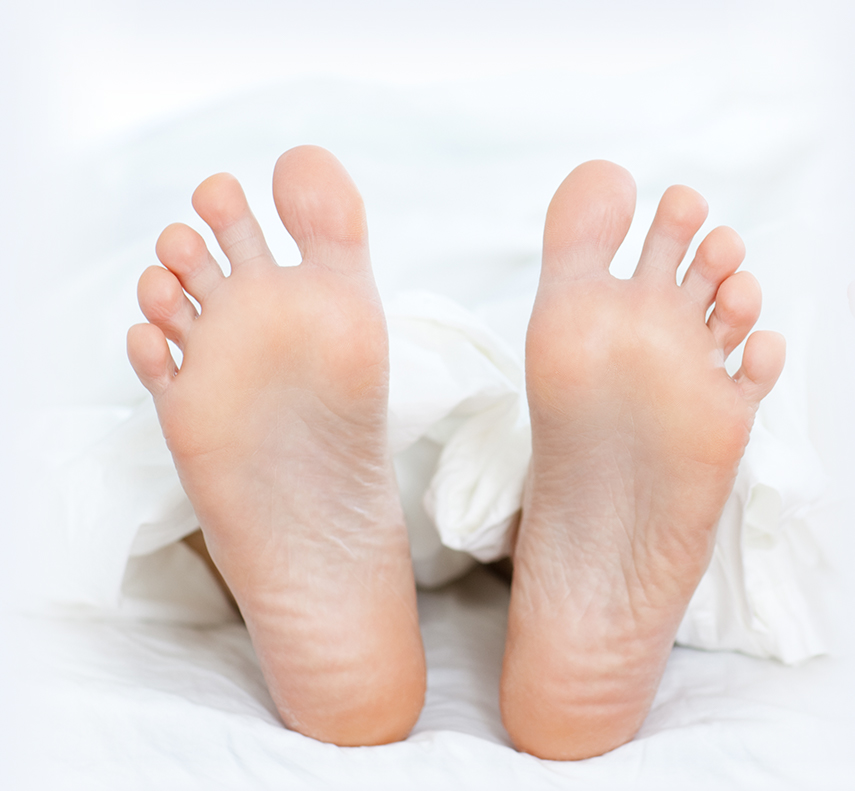Podiatry/Chiropody
Don’t ignore foot problems. Let us treat them.

Most foot problems simply don’t go away on their own — they need medical treatment.
As professional podiatrists, we see the consequences of ignoring these problems. Some patients have endured months of foot pain before contacting us. Others have put up with unpleasant skin conditions.
If you (or someone you know) has a foot problem, our advice is to get it treated straight away. Prompt treatment not only saves unnecessary suffering, it also often prevents the condition getting worse.

- Ageing Feet
- Athlete’s Foot
- Bunions
- Corns/Calluses
- Diabetic Feet
- Dry and Cracked Heels
- Flat Feet
- Heel Pain
- Routine Nail Cutting
- Toenail Problems such as Thickened Fungal or Ingrown Nails
- Veruccae
- Ageing Feet
- Athlete’s Foot
- Bunions
- Corns/Calluses
- Diabetic Feet
- Dry and Cracked Heels
- Flat Feet
- Heel Pain
- Routine Nail Cutting
- Toenail Problems
- Veruccae
Ageing Feet
The ageing foot is often accompanied by degenerative changes and can become problematic. Around a third of people over the age of 65 experience foot pain, stiffness, or aching feet. These difficulties can result in reduced mobility, limited independence, and can contribute to a wide range of health issues.
Our skilled and empathetic podiatrists can diagnose, treat and advise on age-related foot problems.
Athlete’s Foot
Athlete’s foot is a contagious fungal skin infection that can cause:
- Red, sore, flaking skin
- Itchy white patches
- Cracked and bleeding skin
Athlete’s foot is probably most commonly seen on the skin in between the toes, but it can also affect the sole of the foot and the toenails. It is less common on the top surface of the foot.
If you suspect you have athlete’s foot, it is important to get it diagnosed correctly, so that appropriate treatment can be prescribed. Contact us for a professional assessment.
Bunions
Bunions are a complication of disrupted big toe anatomy; they form on the joint at the base of the big toe. The most obvious signs are a red and swollen lumps on the outside of the foot and the big toe pressing against the adjacent one. Bunions are usually painful and many patients consider them unsightly. They can also cause difficulties with footwear fitting.
Our trained podiatrists can diagnose bunions and advise on the best ways to address the problem.
Corns/Calluses
Corns and calluses are thick, hardened layers of skin most commonly found on the soles of the feet and on or in between the toes. They can be uncomfortable and, if left untreated, may sometimes become infected. Corns and calluses are of greater concern for people with diabetes or with poor blood flow to the feet, and self-treatment is not advisable as it may lead to greater problems. Our team will be able to provide the most appropriate form of treatment for your corns and calluses.
Diabetic Feet
Diabetes has serious implications for foot care. People with diabetes may experience reduced sensations of pain, heat and cold in their feet and therefore lack the warning signals which normally precede injury. Our professional podiatrists offer a full range of services, such as nail-cutting and treatment of corns and calluses. We can also advise on all aspects of diabetic foot care.
Dry and Cracked Heels
Dry and cracked heels can be uncomfortable or even painful. In people with diabetes, they can be vulnerable to infection and ulcers. Dry or cracked heels have a variety of causes, including ageing, wearing certain types of footwear and excess pressure (due to excessive standing, for example). Our team can treat dry and cracked heels and advise on how to prevent them reoccurring.
Flat Feet
Flat feet occur when the natural arch on the underside of the foot is abnormally low or absent. This can result in the whole of the foot being in contact with the floor. Where flat feet are causing distressing symptoms, such as painful, aching or tired feet, Watson’s Court Podiatry can help. Treatments include advice on footwear, prescription orthotics (insoles) if required and, where appropriate, foot exercises and stretches.
Further details on orthotic prescription.
Heel Pain
Correct diagnosis of heel pain is vital, as it can have a number of causes, and these causes will dictate the specific requirements and treatment plan. One of the most common causes of heel pain is plantar fasciitis. This is where a band of tissue on the underside of the foot becomes inflamed, resulting in pain or discomfort in the arch and/or the heel. This condition is usually managed through stretching exercises, wearing appropriate footwear, or wearing orthotics (inserts) within footwear. Our caring team will be able to advise you.
Routine Nail Cutting
Some people, such as elderly people, or those with limited mobility, may experience real difficulty in just maintaining their own basic foot care, and may simply need help with cutting their toenails. Also, for people with diabetes or poor foot circulation, self-cutting can easily lead to injury or infection, and it is advisable to seek professional help. Watson’s Court Podiatry can carry out a regular, quick and professional nail-cutting service.
Toenail Problems
Toenail problems are extremely common and can present in many different forms. They include brittle nails, thickened discoloured nails and nails that have become loose following trauma or infection. Ingrown nails are especially problematic, as they can be painful and become infected if left untreated. For ingrown toenails which cannot be managed conservatively, the option of nail surgery under local anaesthetic is offered as a permanent solution. More details on this service can be found on the website. Our experienced team will assess your needs and advise accordingly.
Verrucae
Verrucae, or warts, particularly affecting the hands and feet, represent one of the most common viral infections of the skin. They occur when the skin is exposed to the human papilloma virus, and wart like lesions appear. They are infectious, unsightly and sometimes painful. Our Podiatrists offer safe and effective treatments for this troublesome condition.
How we can help
As qualified podiatrists, we have been trained to prevent, diagnose, treat and rehabilitate abnormal conditions of the foot and lower limbs. Our treatments also prevent and correct deformity, keep people mobile and active, relieve pain and treat foot infections.
The Watson’s Court Podiatry team has the expertise to address all common foot problems, as well as carrying out surgery for ingrown nails.
For further information or to make an appointment, contact us.
Services
Orthotics
Did you know that symptoms such as aching legs, back pain, neck pain and more can be a direct result of poor foot function?
We offer skilled assessment and individually tailored orthotics (insoles) to relieve symptoms.
Nail surgery for ingrown toenails
For ingrown toenails that cannot be managed conservatively, nail surgery may be recommended to provide a permanent solution.
Our specialist nail surgery service is here to relieve the misery of ingrown toenails.